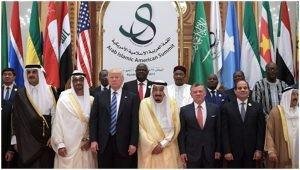
RIGHT already one month from 5 June 2017 Saudi Arabia with Bahrain, Emirates and Egypt blockaded Qatar on charges of funding terrorist groups, backing Iran, and supporting media freedom such as Aljazeera. US President Donald Trump's cyclone seemed to approve the unilateral allegations.
The allegations Qatar has answered are unfounded. The deadline set by Saudi cs for Qatar to meet their 13 demands has passed even though it is extended 48 hours. Reading the list of Saudi demands cs it can be understood that Qatar is being dictated about how to run its foreign policy under the desired rules of Saudi cs. It is common knowledge that the four boycott countries are countries whose people are 'colonized' and 'blackmailed' by Gulf State regimes.
The fears of these regimes are not because Qatar's country is supporting the terror group as alleged all along, but because Qatar provides an opportunity for opposition groups such as the Muslim Brotherhood to voice their opinions in the public sphere, something that is seen as endangering the existence of the countries Still dominated by dictatorial regimes.
The thirteen demands against Qatar also seemed to be turning to slap the face of Saudi cs when it was announced publicly by the country of Qatar because the list is actually intended to be kept secret.
One by one point the demands seem insignificant given the real Arabia cs that do a lot of activities that are urged from Qatar. Regarding economic cooperation with Iran, the UAE is actually the second most heavily business country with Iran (up to 300 billion USD) after China.
There are also no less than 800 thousand Iranians in the UAE who account for about 8 percent of the bay's total population. Saudi cs was known to grant political asylum to regional dictators who seized billions in state money and fled from their homes after massacres of their people such as Zain al Abidin Ben Ali (Tunisia) who now resides in Saudi Arabia, Ali Abdullah Saleh (Yemen ) Who collaborate with the anti-Saudi Shiite Houtsi militia and seek asylum in the UAE or Egypt, Mohamed Dahlan (a pro-Zionist from Palestine who now lives in Abu Dhabi), and so on.
Arabia, UAE and Egypt are also known to finance propaganda media and are also considered to lack the freedom of their own people.
From the above description, it can be understood that Saudi fear over Qatar is not solely due to terrorism, because in fact, Saudi Arabia also contributed much more funds to armed militia groups. Examples are in Yemen, Libya, and Syria.
But this is simply because of the inherent fear of the existence of regimes and monarchical rulers who are not prepared for the changes and their people and the birth of the critics.
Witness history of battles Saudi, Bahrain and Qatar in the past was built around the 18th century.
Qatar Foreign Policy
Qatar's independent and unique foreign policy for a country with its constitutional monarchy is inseparable from its long historical context with the Gulf states and also the blueprint of its Emir-Father, Sheikh Hamad bin Khalifa Al-Thani, the visionaryist.
For the first time, the history of the region, which is now called Qatar in the past, has been under the control of two countries of Bahrain and Arabia.
In 1766, Bani Utbah of the Al-Khalifa faction migrated from Kuwait to the Zubarah region of Qatar which was then occupied by Bani Khalid and in 1783, Bani Utbah succeeded in occupying Bahrain and controlling the whole of Qatar.
In 1788, when Saud bin Abdul Aziz was the founder of the first Saudi Emeralds crown prince, he succeeded in occupying Qatar and the Persian Gulf after subjugating the Bani Khalid. Arabia was forced to withdraw from Zubarah when it was attacked by the Ottomans and Egypt in the West in 1795.
That's when Al-Khalifa from Bahrain with the help of Oman can bring down Zubarah's fort and take over Qatar again. In 1821, the British East India company attacked Doha under al-Khalifa and forced its inhabitants to flee as punishment for piracy by the authorities under Al-Khalifa.
the Al-Thani family emerged as the Qatari ruler under Muhammad bin Thani who became the first leader supported by the British East India Company.
The history of Qatar, once under the rule of Bahrain and Saudis, especially made the Saudi Kingdom, regarded as the ruler of the region since the 1926s thanks to its dominant idiologically dominant Salafi policy, as if it felt Qatar was its loose territory power.
It is no wonder that Qatari leaders always felt under the shadow of a larger and influential Saudi Arabia as a political center in the region and religious center of the Islamic world thanks to the control of two holy cities in the Hijaz.
But the wind of change in Qatar blew in 1995 after Sheikh Hamad bin Khalifa took over the government from his own father, Khalifa. Not long ago this young emir reigned, in 1996, a cousin named Hamad bin Jasim launched a coup against him over a conspiracy from Bahrain and Arabia.
This coup plot was thwarted after one of those involved in the coup leaked the plan to Sheikh Hamad bin Khalifa.
The perpetrators and followers who were former soldiers and police were eventually sentenced to life imprisonment but many were eventually granted forgiveness after several years in prison.
Under Emir Hamad bin Khalifa al-Thani, Qatar seemed to reach the peak of its golden age. As far as the experience lives here, his vision of Emir Hamad has brought Qatar into the world's top-notch per-capita income country at 86,440 dollars per year per head